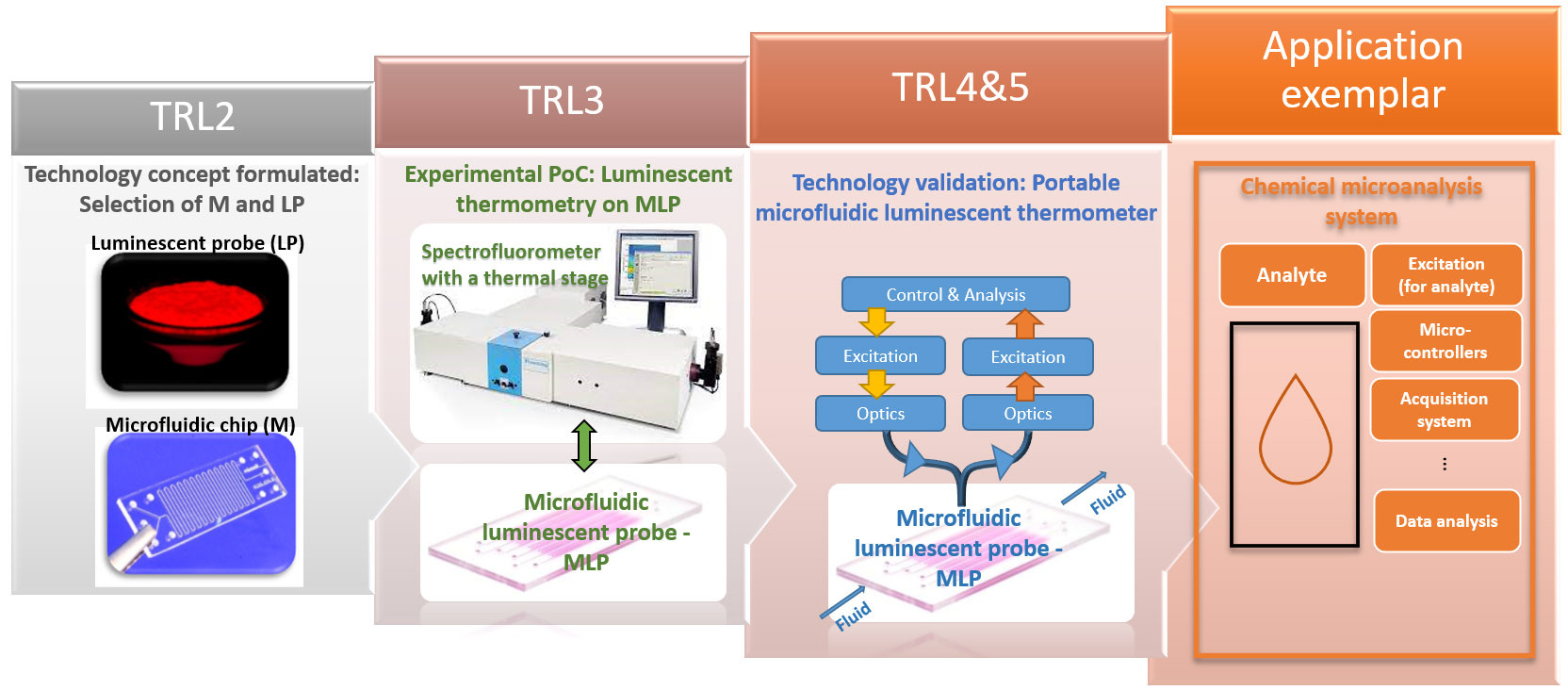REMTES project
Technology for Remote Temperature Measurements in Microfluidic Devices
Истраживање спроведено уз подршку Фонда за науку Републике Србије, БРОЈ ПРОЈЕКТА 7017, ТЕХНОЛОГИЈА ЗА ДАЉИНСКО МЕРЕЊЕ ТЕМПЕРАТУРЕ У МИКРОФЛУИДНИМ УРЕЂАЈИМА – REMTES
This research was supported by the Science Fund of the Republic of Serbia, 7017 Grant No, TECHNOLOGY FOR REMOTE TEMPERATURE MEASUREMENTS IN MICROFLUIDIC DEVICES - REMTES
Temperature sensors account for approximately 80% of the world sensor market, which is expected to be worth 8 billion EUR by 2028. Even though temperature measuring devices abound, only a few thermometers can operate in contemporary environments, such as biomedicine, micro/nanofluidics, and opto/nanoelectronics, where spatial resolutions of less than 1 μm are required. There is a current unmet need for a broadly applicable technique for measuring temperatures in small fluid volumes (< 1 nL), where traditional thermometry is not suitable or even possible. Here, we will develop an optical self-referencing thermometer with a spatial resolution of less than 1 μm by the targeted development of luminescence thermometry. We will design and fabricate novel luminescence thermometry probes using cutting-edge inorganic luminescent materials that emit in the red–deep red–NIR spectral regions and are highly temperature sensitive. By advancing temperature readings from luminescence, we will establish a completely new technology for remote measuring and controlling temperature in microfluidic devices at the technology readiness level 5 (TRL5). As proof of the science-to-technology breakthrough, we will fabricate a showcase exemplar of a photothermally based highly sensitive microfluidic chemical analysis system for the quantification of analytes and the detection of individual nanoparticles in a liquid flow. We will show the prolonged applicability of REMTES outcomes beyond this project in the environmental, biomedical, and optofluidic fields. It is our intention that spin-offs, small and medium enterprises involved in developing specialty microfluidic devices, will benefit from this research in the mid-term. In the long term, advancements in microfluidics and microbiochemical analysis methods will impact both healthcare and the environment.
1. Self-referencing luminescence thermal probes and microfluidic chips
Design and synthesis of chemically and thermally stable inorganic submicron- and nano-sized transition metal and rare earth-doped wide band-gap luminescent thermal probes. Design and fabrication of microfluidic chip for both in situ point and 2D mapping temperature measurements.
2. Theoretical and computational modeling
Theoretical and computational modeling of luminescence properties of thermal probes, heat-producing/diffusion mechanisms, and photothermal conversion efficiency will be performed to tailor the properties of the probes of interest, guide the design and optimization of microfluidic chips, and design of microfluidic luminescent thermometer (luminescence probe integrated into the microfluidic chip) for the Proof of Concept (PoC) study.
3. Microfluidic luminescence thermometers for point and 2D mapping temperature measurements
A microfluidic luminescent probe (MLP) consisting of a luminescence probe integrated into the microfluidic chip will be designed, fabricated, and tested. Both point and 2D mapping temperature measurements will be performed using luminescent thermometry and commercially available laboratory spectrofluorometer.
4. Technology validation
To show the technological applicability of the approach two validations are foreseen:
-
A portable microfluidic luminescent thermometer composed of appropriate optical/electronic components and MLP will be developed and validated for both point and 2D temperature measurements.
- A portable microfluidic luminescent thermometer will be upgraded with a central fluidic system for point and 2D in-situ temperature measurements of selected analyte fluid flowing in microchannels
To demonstrate the transferability of this technology and its wider applicability an application exemplar - the photothermally based highly sensitive microfluidic chemical microanalysis system for the quantification of analytes and the detection of individual nanoparticles in a liquid flow will be presented.


Prof. Dr Miroslav Dramićanin

Dr Željka Antić

Dr Vesna Đorđević

Dr Zoran Ristić

Dr Tatjana Dramićanin

Dr Mina Medić

Dr Aleksandar Ćirić

Dr Ivana Zeković

Dr Sanja Kuzman

Dr Ljubica Đačanin Far

Dr Tamara Gavrilović

Katarina Milenković
1. K. Milenković, I. Zeković, B. Milićević, Z. Ristić, K. Smits, A. Popov, M. D Dramićanin, V. Đorđević, Microwave-assisted solvothermal synthesis of Eu3+-doped CsY2F7 and RbY2F7 phosphorescent nanoparticles, Ceramics International, 50 (15), 26663-26669, 2024, https://doi.org/10.1016/j.ceramint.2024.04.394.
2. A. Rajčić, Z. Ristić, J. Periša, B. Milićević, S. Aldawood, A.N. Alodhay, Ž. Antić, M.D. Dramićanin, Using Principal Component Analysis for Temperature Readings from YF3:Pr3+ Luminescence, Technologies, 12(8), 131, 2024, https://doi.org/10.3390/technologies12080131
3. T. Gavrilović, A. Ćirić, M. Medić, Z. Ristić, J. Periša, Ž. Antić, M.D. Dramićanin, Structure–Dopant Concentration Relations in Europium-Doped Yttrium Molybdate and Peak-Sharpening for Luminescence Temperature Sensing, Materials, 17 (17), 4267, 2024, https://doi.org/10.3390/ma17174267.
4. T. Gavrilović, V. Đorđević, J. Periša, M. Medić, Z. Ristić, A. Ćirić, Ž. Antić, M.D. Dramićanin, Luminescence Thermometry with Eu3+-Doped Y2Mo3O12: Comparison of Performance of Intensity Ratio and Machine Learning Temperature Read-Outs, Materials, 17 (21), 5354, 2024, https://doi.org/10.3390/ma17215354.
5. J. Periša, B. Milićević, A. Ćirić, I. Zeković, V. Đorđević, Ž. Antić, M. D Dramićanin, Advancing luminescence thermometry: Employing multiple fluorescence intensity ratios of YAG: Er3+/Mn4+ nanocrystals for supersensitive temperature sensing, Ceramics International, 51 (17), 23224-23232, 2025, https://doi.org/10.1016/j.ceramint.2025.03.012.
6. Miroslav D Dramićanin, Abdullah N Alodhayb, Aleksandar Ćirić, Readout Methods to Enhance the Performance of Luminescence Thermometers, Condens. Matter 2024, 9(4), 46; https://doi.org/10.3390/condmat9040046 .
7. Jovana Periša, Madalina Ivanovici, Zoran Ristić, Nadyah Alanazi, Abdullah N Alodhayb, Željka Antić, Miroslav D Dramićanin, Dy3+-Activated NaY9Si6O26 luminescent ceramic powder: Optical and thermometric properties, Ceramics International, In Press, https://doi.org/10.1016/j.ceramint.2025.06.023
8. Ljubica Đačanin Far, Aleksandar Ćirić, Katarina Milenković, Mina Medić, Bojana Milićević, Sanja Kuzman, Miroslav D Dramićanin, Doubling the relative sensitivity of YNbO4: Sm3+ luminescence thermometer by observing 4G7/2 emitting level, Journal of Luminescence, Volume 280, May 2025, 121125, https://doi.org/10.1016/j.jlumin.2025.121125
9. A. Ćirić, Z. Ristić, T. Gavrilović, J. Periša, M. Medić, B. Milićević, M. D. Dramićanin, Sensor Fusion in Luminescence Thermometry: A Path to Higher Precision and Broader Applicability. Laser Photonics Rev 2025, e00781
10. Sanja Kuzman, Miroslav D Dramićanin, Aleksandar Ćirić, Jovana Periša, Bojana Milićević, Željka Antić, Zoran Ristić, Machine Learning-Assisted Luminescence Thermometry Using Mn5+-Doped Near-infrared Phosphor with Improved Accuracy and Precision, Sensors and Actuators A: Physical, 397, 117292, 2026.


